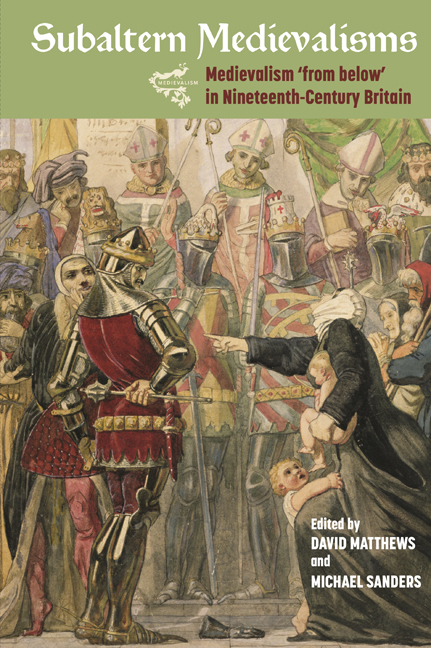Book contents
2 - Resisting Medievalism: The ‘Mediaeval Mania’ and the Working-Class Press
Published online by Cambridge University Press: 09 February 2021
Summary
The ‘Lost Home’ of the Middle Ages
IT IS EASY to construct a history of British medievalism which, in a range of cultural spheres, leads from one notable high point to the next. It would begin with Scott's Ivanhoe (1819), which changed the historical novel and sparked a vogue for depictions of the medieval past. Twenty years later, inspired by the novel, the Eglinton Tournament made a conservative political statement in the guise of a medievalist re-enactment. Queen Victoria and Prince Albert appeared as Queen Philippa and Edward III at a ball in 1842, by which time the Palace of Westminster was being rebuilt in medievalist style as dozens of civic and ecclesiastical buildings around the country were being recreated in Gothic form along lines influentially proposed by Augustus Pugin. Medievalisms in this form have been charted in foundational work by Alice Chandler, which ultimately inspired the journal Studies in Medievalism and helped create the associated discipline.
Chandler's seminal book, A Dream of Order, was central in creating an idea of medievalism as taking an essentially conservative political role. As Chandler wrote, ‘Medievalism … often seems like a frightened response to the terrors of the French Revolution and all the subsequent fears of revolt that agitated England during the turbulent teens and twenties.’ There were also, of course, more reasoned forms of medievalism, including the singular vision of it maintained by William Cobbett, as Matthew Roberts has outlined in Chapter 1. There was the medievalism which, in the hands of Carlyle and Ruskin, attempted to respond to the iniquities of industrialism with the interests of the working man and woman at heart. But even this seemingly more benign form of medievalism has in common with the more conservative forms the appearance of a ‘top-down’ paternalism (and of course, it was largely a failure when it came to genuine mitigation of the circumstances of the working class).
While Rosemary Jann, in 1980, criticised the overwhelming focus on the conservative form of medievalism, and pointed instead to the competing models of Whig and Socialist medievalisms, subsequent accounts have often focused on the same broad narrative as that first laid out by Chandler.
- Type
- Chapter
- Information
- Subaltern MedievalismsMedievalism 'from below' in Nineteenth-Century Britain, pp. 39 - 54Publisher: Boydell & BrewerPrint publication year: 2021

